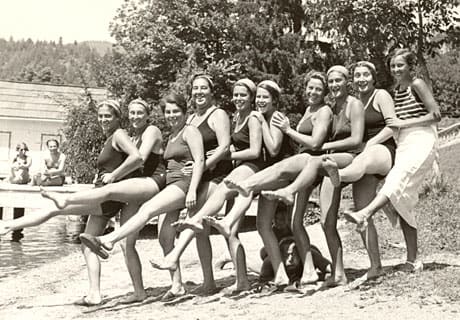Perhaps Watermarks isn't an aesthetically great documentary, but its bringing together of various disparate threads gives it life beyond what many historical docs can offer. The ostensible subject is a reunion of the women's swim team of Hakoah, Austria's Jewish athletic organisation just prior to the war, but as the women reminisce about their personal boldness in the face of the growing threat of Hitler, the film also serves as a ground-level exploration of ugly historical forces in action.
Though Hakoah members regularly trounced their Gentile counterparts in competition, their achievements were effaced by the anti-Semitic atmosphere that culminated in Austria's annexation, such as when the numerous records held by one swimmer were expunged by Nazi authorities. (Incredibly, they weren't reinstated until the mid-'90s.) Thus the film weaves the personalities of the various women and their pride in those achievements with their devaluation and near destruction at the hands of their neighbours. Their recollections of and return to Austria are tainted by these events, and the denial of what happened goes on: one of the women rightly expresses disbelief at the cabbie for whom the Nazi past was simply bad for "non-natives," as if Austrian Jews were never full citizens in the first place.
Still, the film doesn't wallow in misery - if it's bittersweet, it's as determined as its subjects to give their accomplishments presence in the face of enormous pressure. And as director Yaron Zilberman combines their perspectives and personalities, we see the pride beneath the sadness and the resolve to go on. (Mongrel Media)
Though Hakoah members regularly trounced their Gentile counterparts in competition, their achievements were effaced by the anti-Semitic atmosphere that culminated in Austria's annexation, such as when the numerous records held by one swimmer were expunged by Nazi authorities. (Incredibly, they weren't reinstated until the mid-'90s.) Thus the film weaves the personalities of the various women and their pride in those achievements with their devaluation and near destruction at the hands of their neighbours. Their recollections of and return to Austria are tainted by these events, and the denial of what happened goes on: one of the women rightly expresses disbelief at the cabbie for whom the Nazi past was simply bad for "non-natives," as if Austrian Jews were never full citizens in the first place.
Still, the film doesn't wallow in misery - if it's bittersweet, it's as determined as its subjects to give their accomplishments presence in the face of enormous pressure. And as director Yaron Zilberman combines their perspectives and personalities, we see the pride beneath the sadness and the resolve to go on. (Mongrel Media)
